Book contents
- Latinx Literature in Transition, 1992–2020
- Latinx Literature In Transition
- Latinx Literature in Transition, 1992–2020
- Copyright page
- Contents
- Contributors
- Acknowledgments
- Introduction
- Part I Shifting Coordinates
- Part II Transforming Genres
- Chapter 7 The Trouble with Solidarity
- Chapter 8 Arendt’s Children in US Central American Poetry
- Chapter 9 Launching into a Brown Future
- Chapter 10 Latinx Speculative Fiction, Speculative Latinx
- Chapter 11 US Empire and Latinx Children’s Literature
- Part III Emerging Media
- Part IV Theoretical Turns
- Bibliography
- Index
- References
Chapter 7 - The Trouble with Solidarity
Fictions of Pan-Ethnicity
from Part II - Transforming Genres
Published online by Cambridge University Press: 19 June 2025
- Latinx Literature in Transition, 1992–2020
- Latinx Literature In Transition
- Latinx Literature in Transition, 1992–2020
- Copyright page
- Contents
- Contributors
- Acknowledgments
- Introduction
- Part I Shifting Coordinates
- Part II Transforming Genres
- Chapter 7 The Trouble with Solidarity
- Chapter 8 Arendt’s Children in US Central American Poetry
- Chapter 9 Launching into a Brown Future
- Chapter 10 Latinx Speculative Fiction, Speculative Latinx
- Chapter 11 US Empire and Latinx Children’s Literature
- Part III Emerging Media
- Part IV Theoretical Turns
- Bibliography
- Index
- References
Summary
This chapter attends to Valeria Luiselli’s Lost Children Archive (2019) as an exemplary text in the burgeoning corpus of Latinx solidarity narratives in the United States in the twenty-first century. The chapter focuses on the narrative innovations that Luiselli orients toward the task of envisioning new terms for pan-ethnic solidarity. The chapter shows how, at a time of renewed Latinx literary attention to the experiences of Central Americans fleeing violence in the isthmus, Lost Children Archive stylizes a narrative of pan-ethnic solidarity through strategies of scrupulous narratorial self-awareness and an ethical refusal to represent the experiences of ethnic others. In spite of these innovations, however, the chapter also demonstrates how the novel reiterates and amplifies certain essentializing expressions of unity that characterize Sanctuary Movement–era narratives from the 1980s and 1990s.
Information
- Type
- Chapter
- Information
- Latinx Literature in Transition, 1992–2020 , pp. 135 - 150Publisher: Cambridge University PressPrint publication year: 2025
